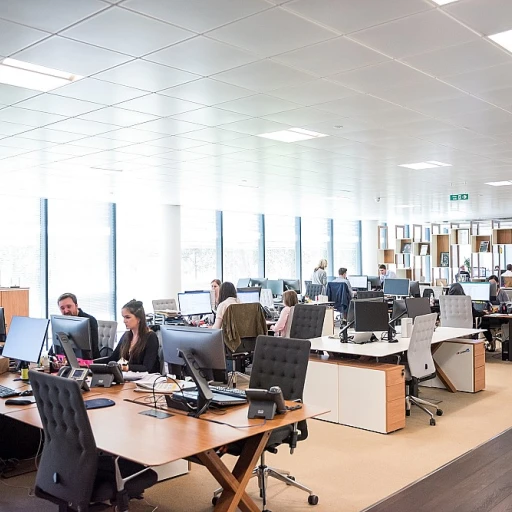
Understanding the Role of a CEO in a UK Company
Defining the CEO's Role in UK Companies
The role of a Chief Executive Officer (CEO) in a UK company is multifaceted and pivotal to the success of the business. As the highest-ranking executive, the CEO is responsible for making major corporate decisions, managing the overall operations and resources of a company, and acting as the main point of communication between the board of directors and corporate operations. This position requires a deep understanding of the business landscape, including the nuances of practice management and the implementation of innovative solutions.
Strategic Vision and Leadership
A successful CEO must possess a strategic vision that aligns with the company's goals and objectives. This involves setting long-term strategies and ensuring that the company remains competitive in the ever-evolving business environment. The CEO's leadership strategies are crucial in guiding the company towards achieving its mission. This includes fostering a culture of innovation and encouraging the adoption of new technologies, which are essential for maintaining a competitive edge.
Operational Excellence and Policy Implementation
Operational excellence is another critical aspect of the CEO's role. This involves overseeing the implementation of effective management practices and policies that enhance the company's performance. The CEO must ensure that the company's privacy policy and user agreement are adhered to, safeguarding the interests of both the business and its stakeholders. Additionally, the CEO plays a key role in developing and executing policies that promote a healthy work environment, which is vital for employee satisfaction and productivity.
Communication and Stakeholder Engagement
Effective communication is a cornerstone of successful leadership. The CEO must maintain open lines of communication with all stakeholders, including employees, investors, and partners. This involves not only conveying the company's vision and goals but also listening to feedback and addressing concerns. Enhancing communication and collaboration within the company is essential for fostering a cohesive and motivated workforce.
For more insights on how CEOs can choose the right systems to support their strategic goals, consider exploring choosing the right fire detection system for your property.
Leadership Strategies from the Oasys Practice CEO
Leadership Insights from the Oasys Practice CEO
In the dynamic landscape of UK businesses, the role of a Chief Executive Officer is pivotal. The CEO of Oasys Practice exemplifies leadership that is both innovative and grounded in practical solutions. With years of experience in practice management, the executive officer has developed strategies that not only drive business success but also foster a culture of growth and collaboration.
One of the key strategies employed by the CEO is the integration of technology to streamline operations. By implementing advanced software solutions, the company has enhanced its efficiency and service delivery. This approach aligns with the broader trend of leveraging technology to improve business outcomes, a theme that resonates across various sectors, including dental and health practices.
Moreover, the CEO emphasizes the importance of a robust privacy policy and user agreement to protect client data, reflecting a commitment to ethical business practices. This focus on privacy and data security is crucial in building trust with clients and maintaining a competitive edge in the market.
Another significant aspect of the CEO's leadership is the emphasis on continuous improvement and innovation. By fostering an environment where new ideas are encouraged and tested, the company remains at the forefront of industry developments. This proactive approach is essential for navigating the challenges faced by office managers and ensuring long-term success.
For those interested in exploring how to enhance their office management practices, understanding the leadership strategies of successful executives can provide valuable insights. To learn more about innovative practices in office management, consider exploring resources on choosing the right fire detection system for your property, which can offer practical guidance on implementing effective solutions.
Challenges Faced by Office Managers in UK Companies
Navigating the Complexities of Office Management in the UK
Office managers in UK companies face unique challenges, often balancing multiple roles while ensuring efficient operations. Recognizing and addressing these challenges is crucial for creating an optimal work environment. Office managers must be well-versed in handling a variety of functions such as human resources, accounting, and technology. This requires adaptability and a strong understanding of the latest practice management solutions to efficiently manage resources and staff. One major challenge is maintaining effective communication channels within the organization. Clear and consistent communication is essential for successful business operations, especially when policies regarding privacy and health need to be rigorously followed. Implementing management systems can aid in streamlining these processes, ensuring policies are adhered to. Additionally, fostering collaboration among employees is a vital aspect that can often be overlooked. When office managers facilitate an environment that encourages teamwork, it can vastly improve productivity and job satisfaction. Incorporating innovative practices can further enhance collaboration, helping to bridge gaps between different departments and fostering a unified workplace culture. The integration of modern software and technology plays a critical role in addressing these challenges. By adopting tools that support real-time collaboration and data management, office managers can drastically improve operational efficiency. Investing in user-friendly software solutions not only simplifies management tasks but also empowers employees, creating a more engaged and motivated workforce. For those aspiring to become effective office managers, acquiring essential qualifications is imperative. These qualifications equip future leaders with the knowledge and skills necessary to tackle the complexities of office management, ensuring continuous improvement and success within the organization.Enhancing Communication and Collaboration
Fostering Effective Communication in the Workplace
In the dynamic landscape of UK companies, effective communication is a cornerstone of successful office management. As highlighted by the leadership strategies of the Oasys Practice CEO, fostering open lines of communication is essential for driving business success. This involves not only the exchange of information but also the cultivation of a collaborative environment where ideas can flourish.
One of the key solutions to enhancing communication is the implementation of advanced technology. Over the years, technology has revolutionized how teams interact, making it easier to share information and collaborate in real-time. Tools such as practice management software can streamline operations, ensuring that everyone is on the same page and that tasks are completed efficiently.
Building a Collaborative Culture
Creating a culture of collaboration requires more than just tools; it demands a shift in mindset. Office managers can take cues from the executive officer of Oasys Practice by promoting an inclusive atmosphere where every team member feels valued. This can be achieved through regular team meetings, open-door policies, and encouraging feedback from all levels of the organization.
Moreover, establishing clear communication policies can help in maintaining privacy and ensuring that sensitive information is handled appropriately. A well-defined privacy policy, for instance, can protect both the company and its employees, fostering trust and transparency within the workplace.
Leveraging Experience for Better Outcomes
Drawing from years of experience, successful office managers understand the importance of adapting communication strategies to fit the unique needs of their teams. This might involve tailoring messages to different departments or using specific channels to reach diverse audiences. By doing so, they can ensure that everyone is aligned with the company's goals and objectives.
In conclusion, enhancing communication and collaboration in UK companies is a multifaceted endeavor that requires a combination of technology, culture, and experience. By adopting these practices, office managers can create a more cohesive and productive work environment, ultimately leading to better business outcomes.
Implementing Innovative Practices in Office Management
Embracing Technological Advancements
In the ever-evolving landscape of office management, integrating technology is no longer optional but a necessity. Successful companies, like Oasys Practice, have demonstrated how adopting innovative software solutions can streamline operations. By leveraging practice management software, businesses can enhance efficiency and reduce time spent on administrative tasks. This approach not only improves productivity but also allows office managers to focus on strategic initiatives.
Implementing Effective Policies
Developing and enforcing clear policies is crucial for maintaining a well-organized office environment. Policies related to privacy, such as the privacy policy and user agreement, ensure that sensitive information is handled appropriately, safeguarding both the company and its clients. Additionally, a comprehensive cookie policy can enhance transparency and build trust with users. These measures are vital for fostering a secure and compliant workplace.
Fostering a Culture of Innovation
Encouraging a culture of innovation is essential for staying ahead in the competitive business landscape. Office managers can take inspiration from leaders like the chief executive officer of Oasys Practice, who prioritize continuous improvement and adaptability. By promoting a mindset that embraces change and seeks out new solutions, office managers can drive their teams towards achieving greater success.
Enhancing Employee Experience
Creating a positive work environment is key to retaining talent and boosting morale. Office managers should focus on implementing practices that prioritize employee well-being, such as flexible working arrangements and health initiatives. By addressing the needs of their teams, managers can cultivate a supportive atmosphere that encourages productivity and satisfaction.


-large-teaser.webp)










